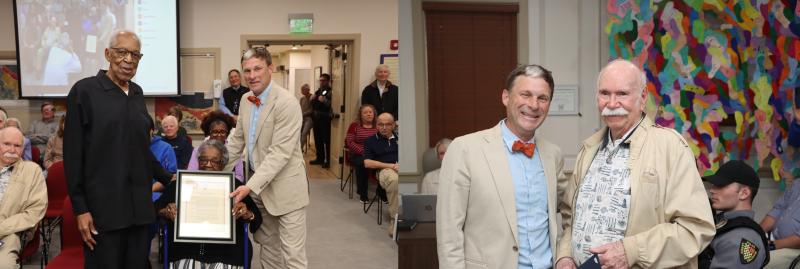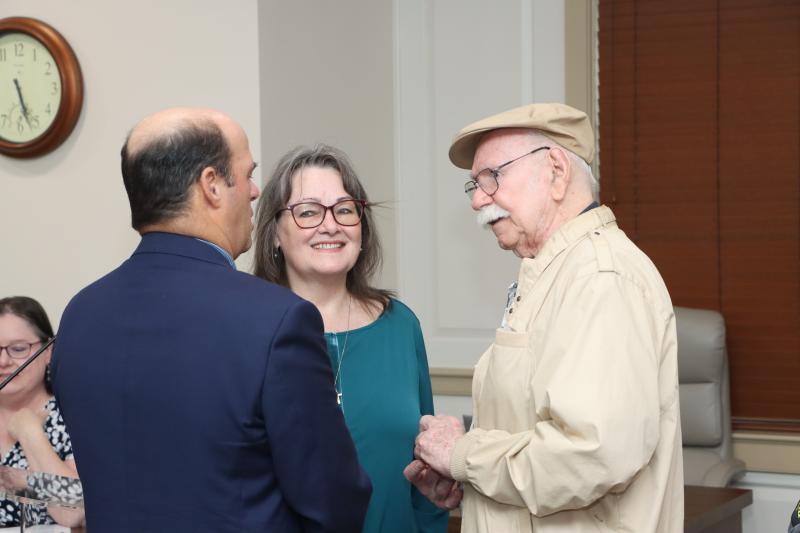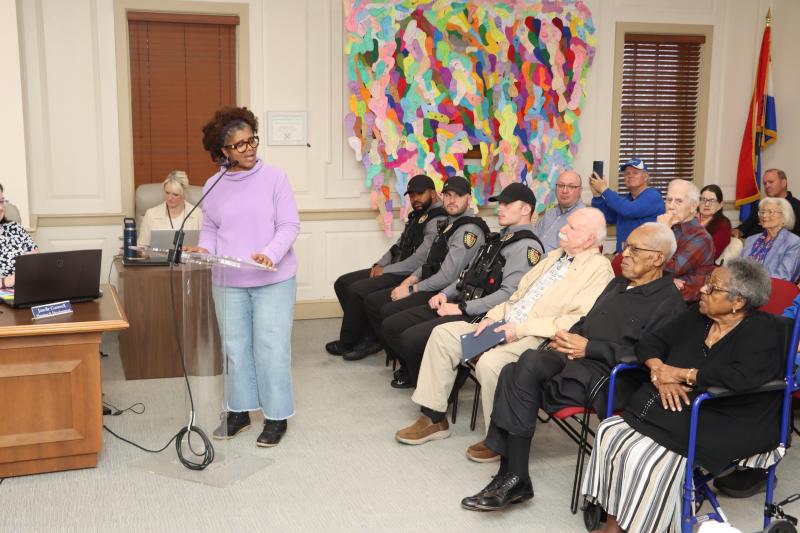Lewes council honors Stenger, Edwards
One man saves dunes, the other saves souls.
They both have had immeasurable impact on life in Lewes for decades.
Mayor and city council honored Dr. John Stenger and the Rev. George Edwards at its April 14 meeting.
Mayor Andrew Williams called them legends of Lewes.
Williams is a former student of Stenger’s, who was a science teacher at Lewes High School and, later, Cape Henlopen High School. The city honored Stenger, 98, for a single event that shaped Lewes’ environmental legacy.
Stenger led a peaceful protest with some of his students that stopped the U.S. Army from bulldozing the Great Dune at Cape Henlopen State Park to build a recreation area. The protest happened April 22, 1970, the first Earth Day.
The council proclamation read, in part, “Dr. Stenger’s leadership, passion and bravery inspired a new generation of environmental stewards and brought national attention to the need for greater protection of public lands.”
Stenger praised the current city council for its commitment to protecting the Cape Region’s natural beauty.
“Your environmental philosophies are a little bit different from the men and women who sat in your seats in the 1970s,” Stenger said.
“The groups that tried to make sure there weren’t cabins there would never have happened if this guy didn’t step up and draw attention to it,” Williams said.
Stenger’s daughter, Nancy, said her father’s environmentalism started in the 1960s. She said most of the people who came to that first Earth Day protest did not even know it was Earth Day, they just loved the park.
“One person can make a difference if there’s a strongly held belief that it’s for the greater good. Don’t be afraid to stand up and speak the truth. I’m very proud of my daddy,” Nancy said.
Before there was a Cape Henlopen State Park, George Edwards worked for Otis Smith on the menhaden fishing boats.
Edwards, 91, is now retiring as pastor at Friendship Baptist Church in Lewes.
In reading the council proclamation, Williams said Edwards has extended his ministry beyond the pulpit by serving on the Lewes African American Heritage Commission.
“Rev. Edwards has been instrumental in preserving, promoting and honoring the rich history of African Americans in Lewes. His advocacy for historical awareness, cultural preservation and social justice has helped educate and inspire future generations.”
“I’m so grateful for what you are doing,” Edwards said. “We thank God that my wife and I are part of this great town of Lewes and the community.”
Trina Brown Hicks, who also serves on the commission, praised Edwards and his church for leading the campaign for the honorary renaming of Fourth Street in honor of the Rev. Dr. Martin Luther King Jr.
“Rev. Edwards has been a gentle giant in the community. He always had a voice, and still does in my book, and has always been a mentor,” Brown Hicks said.
Deputy Mayor Khalil Saliba, who grew up in Lewes, said Edwards’ leadership was a key part of making Lewes a diverse community.
“I give a lot of credit to Rev. Edwards and others, and to the white community. I hardly ever heard any racial comments or epithets. When you hear what was happening in other parts of the country, you were just stunned,” Saliba said.
Saliba said he hopes the city will honor Edwards’ legacy in a similar way to that of George H.P. Smith, Lewes’ first black mayor.
Bill Shull has been covering Lewes for the Cape Gazette since 2023. He comes to the world of print journalism after 40 years in TV news. Bill has worked in his hometown of Philadelphia, as well as Atlanta and Washington, D.C. He came to Lewes in 2014 to help launch WRDE-TV. Bill served as WRDE’s news director for more than eight years, working in Lewes and Milton. He is a 1986 graduate of Penn State University. Bill is an avid aviation and wildlife photographer, and a big Penn State football, Eagles, Phillies and PGA Tour golf fan. Bill, his wife Jill and their rescue cat, Lucky, live in Rehoboth Beach.
























































